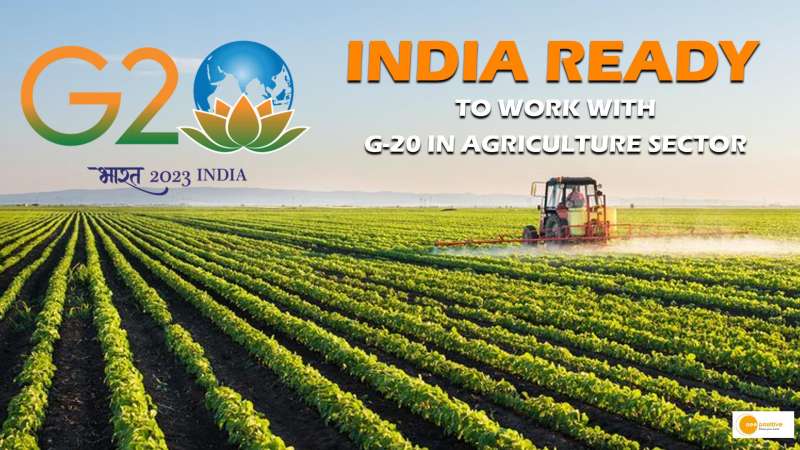

The G-20 Agriculture Ministers, under the leadership of India’s Prime Minister Shri Narendra Modi, convened a three-day meeting in Hyderabad to discuss crucial sectors and prioritize the global agenda for agriculture. The meeting witnessed the participation of over 200 delegates, including representatives from member countries, invited nations, and international organizations. Union Agriculture and Farmers Welfare Minister Shri Narendra Singh Tomar, in a press conference, emphasized India’s commitment to food security, nutrition, and sustainable agricultural practices.
Priority Areas Discussed
1. Food security and nutrition: The meeting focused on improving social protection systems, promoting agro-diversification, and enhancing food security. Emphasis was placed on the development of robust systems to ensure the availability of nutritious food to vulnerable populations.
2. Sustainable agriculture and climate resilience: Participants discussed financing strategies for green and climate-resilient agriculture, utilizing climate-smart approaches, technologies, and farming systems for sustainable agricultural production. The goal is to enhance agricultural resilience in the face of climate change.
3. Strengthening infrastructure for small and marginal farmers: The meeting highlighted the importance of improving infrastructure, especially for smallholder farmers, women, and youth. Participants emphasized sharing technology, promoting investments, and creating economic opportunities within inclusive agricultural value chains and food systems.
4. Digitalization for agricultural transformation: The Agriculture Working Group explored the potential of digitalization in transforming the agri-food sector. Standardized agricultural data platforms were emphasized as digital public goods, and discussions revolved around leveraging emerging digital technologies to promote agricultural efficiency and innovation.
India’s Agricultural Success
Shri Narendra Singh Tomar highlighted India’s significant contributions to the agriculture sector and its willingness to share knowledge and experiences in the global interest. Over the past nine years, India has implemented pioneering programs and policies focused on the welfare of small and medium farmers. Efforts have been made to address climate change and promote sustainable agriculture, including initiatives like the International Year of Millets and crop diversification awareness campaigns.
India’s focus on organic and natural farming, as well as the development of climate-suitable crop varieties by the Indian Council of Agricultural Research, underscores its commitment to sustainable agriculture. The country’s agricultural exports continue to grow, benefiting farmers and contributing to the global food market.
Side Events at the Meeting
The G-20 Agriculture Ministers meeting featured several side events aimed at exploring diverse topics and engaging stakeholders. Two notable events were:
1. Managing Agribusiness for Profit, People, and Planet: The panel discussion centered on trade-offs between profitability, social well-being, and environmental sustainability. Private companies showcased examples of building robust supply chain systems and identifying solutions, policies, and programs to achieve greater sustainability within food systems.
2. Connecting the Digitally Disconnected: This event focused on harnessing the power of digital technologies in agriculture. Panelists from Agri Tech companies, start-ups, and international organizations discussed strategies for scaling up and replicating successful digital agriculture initiatives. They also explored interventions by governments and stakeholders to bridge the digital divide and support the digitally disconnected population.
Benefits of the Decision
1. Enhanced Food Security: The discussions and decisions made during the G-20 Agriculture Working Group meeting contribute to improved food security globally.
2. Climate Resilience: By promoting climate-smart approaches and technologies, the decision helps farmers adapt to the challenges posed by climate change, ensuring
the continuity of agricultural production and reducing vulnerability to extreme weather events.
3. Infrastructure Development for Small Farmers: Strengthening infrastructure for small and marginal farmers, women, and youth brings multiple benefits.
4. Digital Transformation in Agriculture: The decision to leverage digitalization in agriculture opens up new possibilities for efficiency, innovation, and knowledge sharing. It will promote precision agriculture, facilitates better decision-making, and supports farmers in adopting sustainable practices.
5. Economic Opportunities: By focusing on inclusive agricultural value chains and food systems, the decision aims to increase economic opportunities for farmers.
Conclusion
The G-20 Agriculture Working Group meeting in Hyderabad brought together global stakeholders to prioritize key areas of focus for sustainable agriculture. With India’s leadership, the meeting aimed to enhance food security, promote sustainable practices, strengthen agricultural infrastructure, and leverage digitalization for agricultural transformation. The discussions and initiatives undertaken during the meeting exemplify the transformative power of collective action and the commitment of nations to create a more resilient and efficient global agricultural landscape.
Also Read: G20 Summit: जानें प्रधानमंत्री मोदी ने क्यों काशी को संस्कृति और आध्यात्मिकता का केंद्र कहा?


